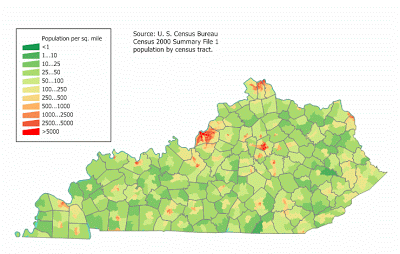Health News
- Older Rural Residents Are More Likely To Seek Care At Rural Hospitals, National Study Finds
Rural hospitals are more likely to serve older patients seeking hospitalization, while younger rural residents seek medical care in urban areas, says a study by the National Center for Health Statistics at the federal Centers for Disease Control....
- Lame-duck Congress Could Cut Funding For Critical Access Hospitals; More Than Two Dozen In Kentucky
Critical access hospitals, which in most states are rural facilities with fewer than 25 beds, may be under attack in the lame-duck session of Congress, former national rural-health director Wayne Myers writes for the Daily Yonder. President Obama's...
- Statewide Trauma System Established; Called 'most Significant Advancement In Health Of Kentuckians For The Last 20 Years'
Dr. Andrew Bernard, chair, State Trauma Advisory CommitteeTen Kentucky hospitals have been recognized as part of the state's first official statewide trauma system. The announcement came during the 2012 Statewide Trauma and Emergency Medicine Symposium...
- Federal Cuts, Financial Instability And Competition Leave Many Rural Hospitals Fearing The Future
Many rural hospitals could be forced to close because of cuts to the Critical Access Program and the fact that, according to the National Rural Health Association, , 41 percent of critical-care hospitals are losing money, reports Jenny Gold of Kaiser...
- Rural Hospitals To Get Federal Help For Recruiting Physicians
Critical-access hospitals will get help recruiting physicians to their rural areas through an expanded loan repayment program that is part of President Obama's new jobs initiative for rural America. The initiative is called the National Health Service...
Health News
Americans having to travel farther to get trauma treatment as hospitals close
Millions of Americans are farther away from trauma care than they were 20 years ago, with some having to travel more than 30 minutes to get treatment. Experts say getting help within the first hour is crucial.
A study published in the journal Health Affairs found the distance to a trauma center "increased for 69 million people between 2001 and 2007," reports the Daily Yonder, the national online rural journal. The average amount of travel time was 10 minutes. But for 16 million people, the amount of time it took to travel to a trauma center increased by 30 minutes or more.

"The greatest impact from diminished access has been on people in rural communities," as well areas with a high percentage of African-American residents, low-income people and those without health insurance, The Associated Press reported.

Though U.S. Census numbers show cities growing in population while rural areas decline, Kentucky is still considered a largely rural state (see right), ranking 23rd in the country for population density.
The reason for the increased travel times is due to facilities closing. In 1990, there were 1,125 trauma centers in the country. By 2005, nearly 340 of them had closed, in most cases because of financial hardship; they were treating too high a percentage of people who do not have insurance, Daily Yonder reports.
President Obama's recent call to cut Medicare premiums to critical access hospitals, as well as close CAHs that are within 10 miles of each other, would further burden rural areas, said a panel of experts in Lexington Wednesday.
Medical experts say a trauma patient has the highest change at survival if treated within the first hour. "We're not saying that we should build a trauma center on every street corner," said Dr. Renee Hsia, lead researcher on the study. "But we do have evidence that access for certain populations is already pretty bad, and it's getting worse." (Read more)
- Older Rural Residents Are More Likely To Seek Care At Rural Hospitals, National Study Finds
Rural hospitals are more likely to serve older patients seeking hospitalization, while younger rural residents seek medical care in urban areas, says a study by the National Center for Health Statistics at the federal Centers for Disease Control....
- Lame-duck Congress Could Cut Funding For Critical Access Hospitals; More Than Two Dozen In Kentucky
Critical access hospitals, which in most states are rural facilities with fewer than 25 beds, may be under attack in the lame-duck session of Congress, former national rural-health director Wayne Myers writes for the Daily Yonder. President Obama's...
- Statewide Trauma System Established; Called 'most Significant Advancement In Health Of Kentuckians For The Last 20 Years'
Dr. Andrew Bernard, chair, State Trauma Advisory CommitteeTen Kentucky hospitals have been recognized as part of the state's first official statewide trauma system. The announcement came during the 2012 Statewide Trauma and Emergency Medicine Symposium...
- Federal Cuts, Financial Instability And Competition Leave Many Rural Hospitals Fearing The Future
Many rural hospitals could be forced to close because of cuts to the Critical Access Program and the fact that, according to the National Rural Health Association, , 41 percent of critical-care hospitals are losing money, reports Jenny Gold of Kaiser...
- Rural Hospitals To Get Federal Help For Recruiting Physicians
Critical-access hospitals will get help recruiting physicians to their rural areas through an expanded loan repayment program that is part of President Obama's new jobs initiative for rural America. The initiative is called the National Health Service...
